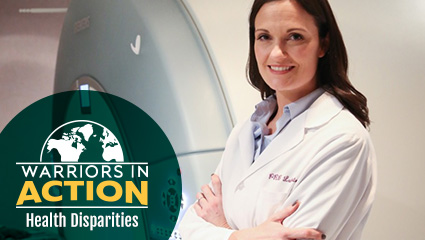Over the coming months, look for videos, stories and events that feature some of the many Wayne State initiatives and passionate individuals committed to eradicating health disparities. This content is part of WSU's Warriors in Action campaign highlighting how Wayne State is making a difference.
Forty-one percent of children living in Detroit will experience trauma serious enough to cause post-traumatic stress disorder (PTSD) — the disorder best known for causing depression, nightmares and flashbacks in military personnel after returning from combat abroad.
 While researchers are beginning to understand the impact of PTSD on the delicate chemical balance within the adult brain, relatively little is known about the effects of the disorder on the developing brain of a child or adolescent. Moriah Thomason, Ph.D., a Wayne State Assistant Professor in the Department of Pediatrics and at the Merrill Palmer Skillman Institute of Child and Family Development, hopes a new research project will change that.
While researchers are beginning to understand the impact of PTSD on the delicate chemical balance within the adult brain, relatively little is known about the effects of the disorder on the developing brain of a child or adolescent. Moriah Thomason, Ph.D., a Wayne State Assistant Professor in the Department of Pediatrics and at the Merrill Palmer Skillman Institute of Child and Family Development, hopes a new research project will change that.
“We think our research approach — combining clinical and behavioral information with the latest real-time brain imaging technology — gives us a great opportunity to understand the biological differences in a developing brain experiencing the effects of PTSD,” Thomason said. “Once we get there, we can start addressing treatments that are going to help these young people regulate emotions better.”
As the director of Wayne State’s SCAN (Social Cognitive Affective Neurodevelopment) Lab (www.brainnexus.com), Thomason and her team are at the forefront of new research aimed at pinpointing areas of the developing brain that change when exposed to trauma. She credits team members such as Hilary Marusak, Ph.D., as a major intellectual contributor and driving force behind the work. With Thomason as her advisor, Marusak recently finished her Ph.D at Wayne State and did her dissertation on childhood trauma.
The SCAN Lab examines the development of large-scale brain networks in children. The group’s theoretical thrust follows from what developmental psychologists have long noted: that cognitive and affective operations improve in parallel and that complex high-order operations are reliant upon foundational improvements in more basic, general and distributed processes. The SCAN Lab uses functional and structural MRI technologies to advance network-level hypotheses of neural development.
“We have found evidence that childhood trauma exposure alters the trajectory of brain development,” Thomason said. “In particular, we see changes in structure and function of regions responsible for emotion processing and regulation, including the amygdala, insula, and anterior cingulate cortex. These may affect a child’s ability to regulate their emotions, or to ignore distracting emotional information.”
Thomason’s lab partners with several mental health service providers in the area to use neuroscience to help answer real-world questions, and as a means of developing neurobiologically-informed interventions that can be used in the clinic to help pediatric patients.
“Our long term goal is to develop interventions capable of reducing symptoms and improving quality of life for young people affected by trauma and/or PTSD,” Thomason said.
Interested in being part of Thomason’s SCAN Lab? Volunteer research assistant (RA) positions are regularly available in the lab for undergraduate, postgraduate or honors students. RAs have the opportunity to be involved in medical research in a hands-on way. If interested, apply online.
